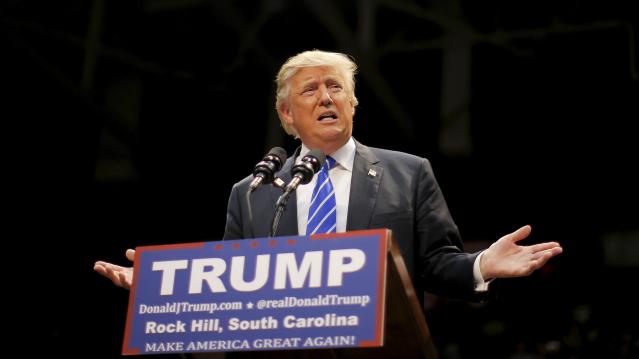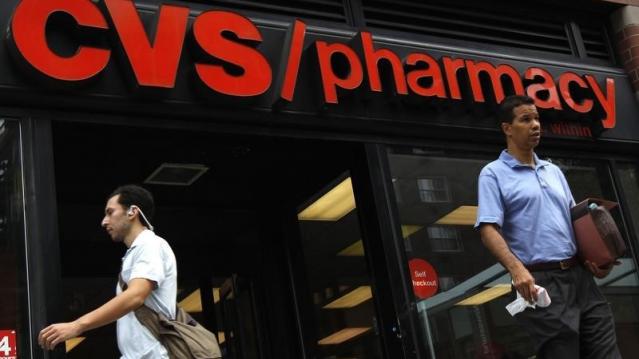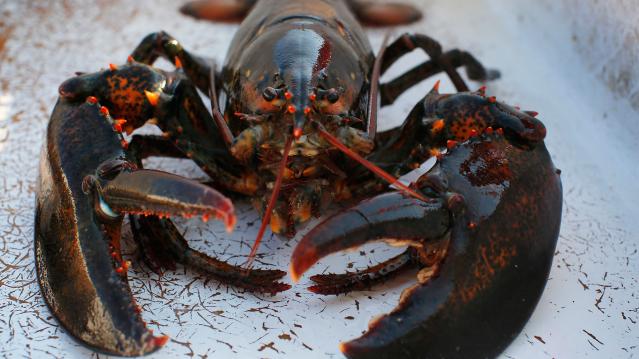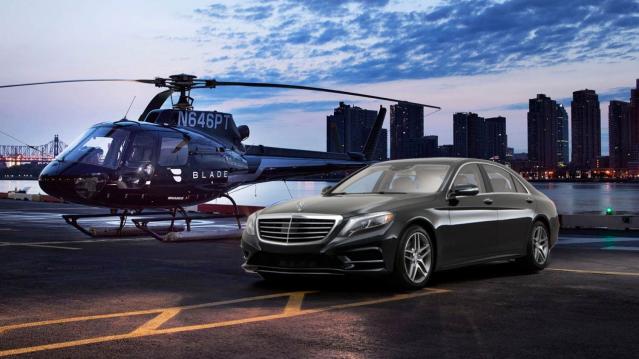How CNN Is Cashing In on Trump-Mania

Fox News’s GOP debate last month generated blockbuster ratings — 24 million viewers saw Donald Trump and the other top Republican presidential contenders mix it up, making it the most-watched non-sports cable show ever. Now Fox News rival CNN is poised to cash in on that success.
The news network is asking advertisers to pay 40 times its usual rate, or as much as $200,000 for a 30-second commercial, during the second GOP debate, which it is scheduled to host on Sept. 16, according to Ad Age. CNN is also charging $50,000 to $60,000 for commercials airing that day in the earlier debate between second-tier candidates.
Related: Two New Polls Show Exactly Why Donald Trump Is Winning
Ad Age says CNN isn’t expected to pull in quite the same level of viewership as Fox News did, but even if the next primetime debate fails to match the earlier numbers, it is still likely to be the most-watched debate CNN has ever aired. The network can thank Trump for that, just as it could thank another outspoken and unpredictable GOP phenomenon for helping to set its previous debate record: In 2008, almost 11 million viewers tuned in to the vice presidential debate between Joe Biden and — you betcha! — Sarah Palin.
If the Palin example holds, news networks aren’t going to be the only ones to benefit from the Trump surge. “Saturday Night Live” saw its viewership and buzz soar in 2008 as Tina Fey’s impersonation of Palin became a sensation in its own right. And when the former Alaska governor appeared on SNL in October 2008, the show drew its highest ratings in 14 years.
Related: Trump Is Still Surging — Here’s Who Can Stop Him
The new season of SNL starts Oct. 3, so it’s probably a safe bet that Lorne Michaels — and other executives at NBC, even after the network dumped Trump from The Celebrity Apprentice in the wake of his comments about Mexican immigrants — are rooting for Trump mania to keep going for another month, at least. In the meantime, NBC announced Tuesday that Trump will appear on “The Tonight Show” next week.
Top Reads from The Fiscal Times:
- Doctors to Trump: Deporting Illegal Immigrants Would Be Bad for U.S. Health
- How Much Does Our Social Safety Net Cost? $742 Billion a Year and Rising
- If Clinton Loses Her Security Clearance, Could She Still Be President?
CVS Quit Selling Cigarettes, but It’s Found a Patch for Sales

CVS executives knew that some of their sales would go up in smoke when they decided last year to stop selling cigarettes. The press release announcing that all 7,600 CVS stores nationwide would stop selling all tobacco products acknowledged that sales would take a hit. Still, the company said, “This is the right thing to do.”
The costs of the decision are now becoming clear. CVS Health’s general merchandise sales slumped 7.8 percent last quarter on a same-store basis, the company said Tuesday. The company claims non-pharmacy sales would have stayed the same if tobacco sales — and the other products cigarette buyers added to their baskets — were removed from sales figures for the same quarter in 2014.
Related: Why Smoking Is Even Worse Than We Thought
Same-store sales in the pharmacy category climbed 4.1 percent, boosting overall same-store sales growth to 0.5 percent compared with the second quarter of last year, down from a 1.2 percent year-over-year increase the previous quarter. Net revenue overall grew by 7.4 percent to $37.2 billion, helped by pharmacy services revenue that surged 11.9 percent ($2.6 billion) to $24.4 billion. The company has reportedly increased its market share in the health and beauty categories (it did, however, narrow its full-year earnings forecast).
So even as the move to drop cigarettes has cost the company, its bet on health as the source of future growth may be starting to pay off. CVS stock dropped in the wake of its earnings announcement, but shares are still up more than 15 percent on the year and 44 percent over the past 12 months.
Is the American Dream Dead? Most Parents Think Their Kids Will Be Less Well Off

Parents think their children will be happier and healthier in the future as adults, but also less well off, according to a new report commissioned by insurance company Haven Life.
Only one in eight Americans believe that their children will be better off financially, when compared to their parents. More than half of American parents believe their children will have less disposable income in the future, and only one in five Americans believe their children will enjoy greater quality of life.

Related: Should You Leave Your Home to Your Kids?
On the other hand, more than 60 percent of adults believe that future generations will lead “as healthy or healthier” lifestyles than adults today. And half of them think their children will grow up to be more environmentally conscious adults who lead greener lifestyles. More than half believe that this future generation will be more ethnically and racially diverse.
The study was done by YouGov for the Haven Life Insurance Agency. YouGov conducted an online poll with a representative sample of 1,124 U.S. adults in the first quarter of 2015.
Top Reads from The Fiscal Times
- The 10 Fastest-Growing Jobs Right Now
- Teens Are Having Much Less Sex Than Their Parents Did at That Age
- 9 Social Security Tips You Need to Know Right Now
Travel Nightmares: How to Avoid Getting Bumped from Your Flight

You're finally on your way out for a summer vacation. The flight was booked months ago. Your bags are packed and ready. You arrive at the airport the recommended 90 minutes before the scheduled departure time (because it's a great long trip, and you've decided to check your bags). After enduring the inhumanity that is the TSA line, you get to your gate. Of course, everyone else has done the same thing, and you hear the familiar strains of "this flight is overbooked, we are offering a travel voucher if you are willing to fly on a later flight."
But you ignore that, as always, because, well, your bags are already on the plane, and you don't want to miss even a second of your long-awaited time away. Still, that $300 voucher sounds tempting. You could use it to help defray the cost of holiday travel in a few months.
Don't do it. Resisting that temptation can be even more rewarding: If the worst still happens and you get involuntarily bumped, you can get a full refund of your ticket price plus up to $1,300 in added compensation.
The AirHelp inforgraphic below lays out the basic dos and don'ts of dealing with an overbookd flight. You can also find more from AirHelp here.
(h/t lifehacker.com)
Blame China for Your Costly Lobster Roll

Looking for authentic, down-home Maine lobster? Head to China.
The upsurge in demand for lobster in China this year has caused the price of the succulent marine crustacean to shoot up to record highs in the U.S., according to Bloomberg News. Wholesale prices for lobsters have clawed 32 percent higher over the last year.
Lacking a lobster industry itself, China used to rely on Australian imports to meet the demand from an expanding middle class that views lobster as a status symbol. But in 2012, as catches off of Western Australia began dwindling and prices of lobster fell in the Gulf of Maine, China changed its main supplier to the U.S.
Related: McDonald’s Aims for a Classier Crowd with Lobster Rolls
Lobster exports from the East Coast are the main reason for the hike in fish and seafood exports to China in recent years, according to U.S. Department of Agriculture data. Over the past seven months, about 60,000 live North American lobsters a week make the 7,500-mile trek halfway across the world. The lobsters must still be alive by the time they arrive in China or else they lack appeal, so they’re packed in wet newspapers and Styrofoam coolers for a trip that must be made in 18 hours or less, according to Bloomberg.
Another reason for the surge in prices was the bitterly cold winter this year, which slowed the catch in Canada and delayed the summer harvest in Maine.
Holding off on your lobster roll until next summer in the hopes that prices will wane? Don’t count on it. The Chinese middle class is still growing rapidly, and the country already consumes 35 percent of the world’s seafood — a number likely to increase.
Top Reads from The Fiscal Times:
- Born in the USA: 24 Iconic American Foods
- America’s 10 Top Selling Medications
- You’re Richer Than You Think. Really.
Meet Blade, the Uber for Helicopters in NYC

Uber may be convenient, but New York’s Hamptons set doesn’t always have the time or patience to deal with the traffic getting out to their summer spots on Long Island’s East End.
Blade, which calls itself “the first digitally driven short distance aviation company,” says it has a solution for those who want to get to East Hampton within the hour, or Southampton in 35 minutes: Ordering their own chartered helicopter via an app.
Related: 10 Biggest Tech Flops of the Century
Once you download the app, you can select your flight time, chill out in a Blade lounge at a Manhattan heliport and then enjoy “a snack, a drink, a newspaper and lots of other fun things” on your flight. Passengers are allowed one carry-on weighing 25 lbs. maximum — but no golf clubs.
The service, which launched in May 2014, doesn’t come cheap, at $595 per seat to go to Quogue, Southampton, East Hampton, Montauk or Fire Island. Blade can also be booked for trips to Nantucket, Martha’s Vineyard, Cape Cod and some other destinations in the Northeast as well as to the New York area’s major airports.
The website advises that if your flight is grounded due to bad weather, you’ll be offered a ride to your destination in a chauffeured Mercedes at no extra cost.
Top Reads from The Fiscal Times:
- The Best Things to Charge on Your Credit Card
- The Wealthy Worry, Too—And It’s Not All About Money
- 10 Best Islands in the World

